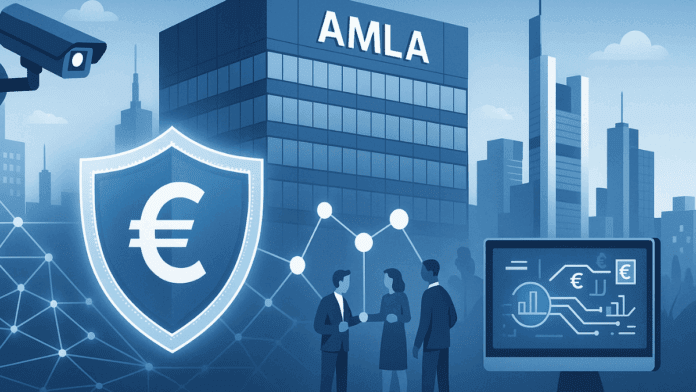A major move has just been made in the European Union to fight financial crime. A brand-new agency called the Anti-Money Laundering Authority (AMLA) has started work in July 2025. It is based in Frankfurt, Germany, and aims to stop dirty money from flowing through banks, crypto firms, and other financial systems.
AMLA Kicks Off With a Clear Mission
Before Anti-Money Laundering Authority existed, each EU country had its own rules to fight money laundering. That made it easier for criminals to move money from one country to another without being caught. AMLA is changing that by becoming the single authority that works across all EU nations.
AMLA officially began operations on July 1, 2025, and it has already started building its team and systems. Its job is to watch how financial institutions handle risks. That includes banks, payment companies, and crypto providers. The goal is to make sure all firms are spotting suspicious activities and reporting them correctly.
One of AMLA’s key roles is to make sure that financial rules are the same everywhere in the EU. That means creating a Single Rulebook for all financial companies to follow. This will reduce confusion and close gaps in the system that criminals often use to hide money.
Singapore strikes back: Dirty money directors face lifetime ban after S$3B scandal
The agency is also helping countries share information more effectively. Each EU country has a Financial Intelligence Unit (FIU) that tracks and reports suspicious transactions. AMLA will help all FIUs work together faster and smarter.
First Work Plan Sets the Foundation
In July, AMLA released its very first official document: the Work Programme 2025. This document lays out what AMLA plans to do for the rest of the year. The early focus is on setting up its office, hiring staff, and creating processes.
AMLA is also starting to design its supervision strategy. This means figuring out how it will monitor financial firms, carry out inspections, and take action if rules are not followed. It won’t directly supervise every company just yet—but it’s building the systems to do so in the near future.
The agency is also working closely with other EU institutions to ensure that everything lines up with existing laws and standards. It’s a big job, but it’s all part of creating a unified and stronger fight against financial crime.
The work plan also highlights a special focus on high-risk sectors. These include firms that move a lot of money or operate across many borders. AMLA is already looking at which companies may need closer attention once it begins full supervision.
Crypto Industry Faces Higher Scrutiny
One area getting special attention from AMLA is the cryptocurrency sector. These are companies that deal with digital currencies like Bitcoin, Ethereum, and others. Because digital money moves quickly and often without names attached, it can be used to hide illegal funds.
AMLA has made it clear that crypto companies must follow strict anti-money laundering rules. They must know who their customers are, check where the money is coming from, and report any suspicious behavior. These are the same expectations placed on banks and other financial institutions.
This is also linked to the EU’s new crypto rules under the MiCA regulation. MiCA brings clear rules to the digital asset world, and AMLA will help make sure these rules are followed across all EU countries.
Though full direct supervision won’t begin until later, AMLA is already preparing to oversee about 40 high-risk firms. These may include banks, payment platforms, and major crypto services. Even now, AMLA is building systems to monitor these firms closely.
The agency’s message is simple: all financial firms—big or small, traditional or digital—must take responsibility for keeping their systems clean. AMLA will be watching, and everyone must be ready to follow the same strong rules.
